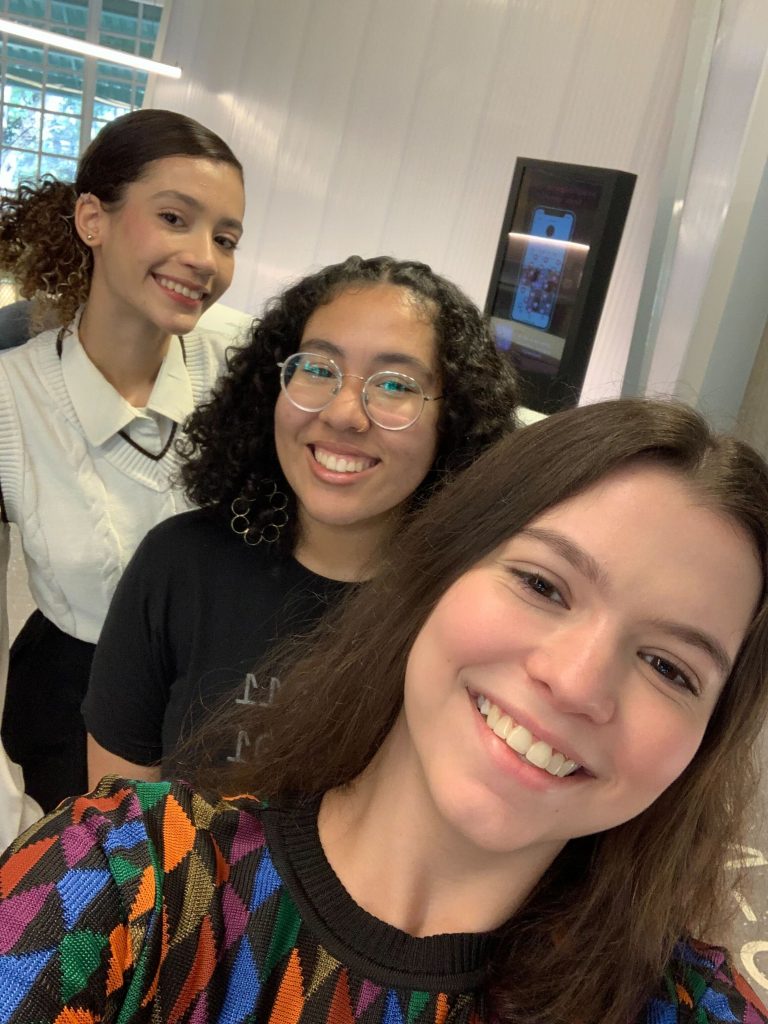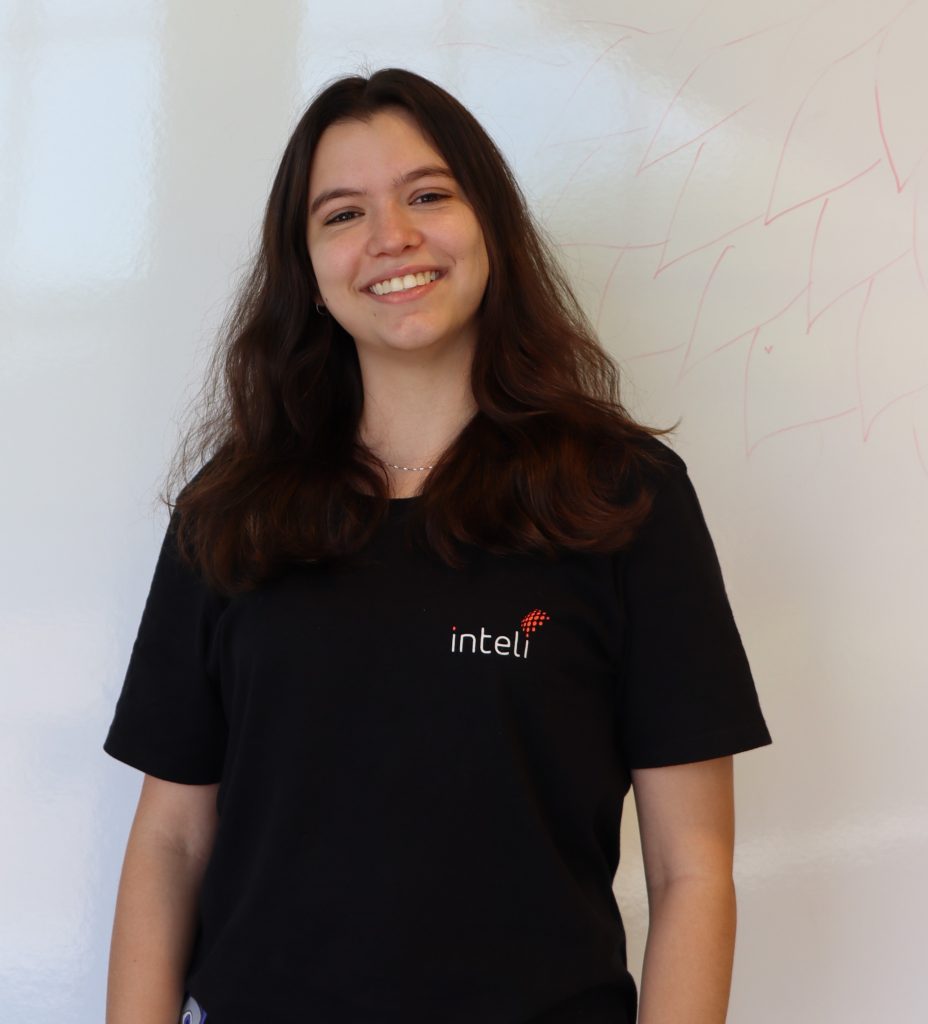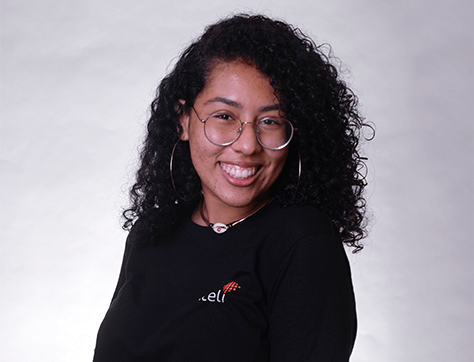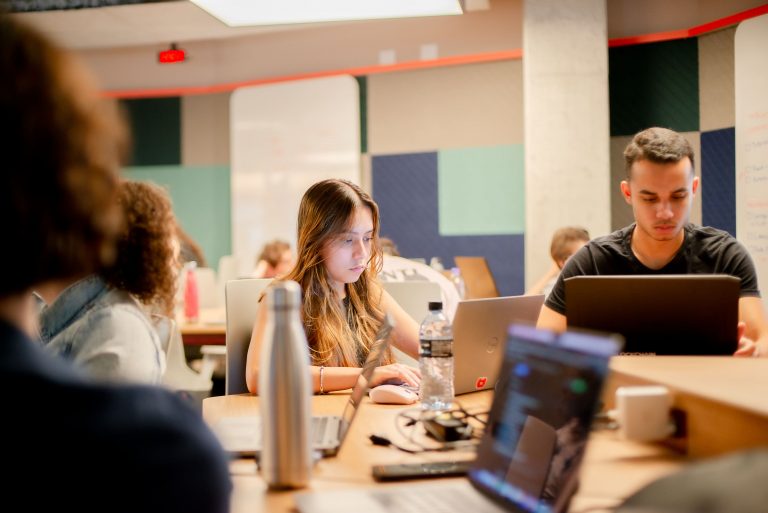Meet the girls behind the management of the Student Center, the Benedito Caravelas Black Movement and the Grace Hoper collective.
Not everyone knows it, but the first algorithm to be processed by machines was created by Ada Lovelace, an English mathematician who is considered the founder of Computer Science and the first female programmer in history. More than a century later, women are still fighting for recognition in the world of technology.
Just as in Ada's time, the list of challenges to pursuing a career in technology remains enormous for women, such as gender stereotypes, few female inspirations, unconscious bias, toxic work culture and lack of incentives.

Here at Inteli, we've been rolling up our sleeves since day 1 so that more girls can occupy the prominent space and the leading role they deserve. And to talk about this journey, there's nothing better than chatting to three incredible women who are making history here. Malu Maia, 18, Thainá Lima, 18, and Tainara Rodrigues, 20, are part of our first class and lead three student groups that are shaking up the Inteli community.
Spoiler: they agree that they still have a lot of work to do. But they know they have all the support they need to create a welcoming environment so that other girls feel welcome to transform the world through technology.
The journey to Inteli
Thainá, a young black woman, grew up in Vitória da Conquista, Bahia, very close to a quilombo. "My mother started working as a child, so she taught me that education was the only thing that nobody could take away from me. Every day she tells me that I'm going to change the world," says Thainá.
Fascinated by technology, she began to explore her interests on her own. She won a scholarship from Sesi, entered the world of robotics and took part in team research projects and the Brazilian Young Scientists Fair. "My passion for technology has extended to other areas, including the development of shared bicycles with more affordable prices for the community."

For Malu, the awakening to the tech world came during the pandemic, when she realized how much she could contribute to the field. Support also came from her economics teacher mother, who encouraged Malu to fight for her dreams. "My mother left the interior of Minas Gerais and went to Belo Horizonte to study when she was only 16. She was always an inspiring woman and practically brought me up on her own," she recalls.
Tainara was born and raised in the state of Ceará, and since she was a child she had always aspired to become a woman who would go beyond boundaries. During high school, she won a bronze medal at the Science Olympiad and an honorable mention at OBMEP, as well as taking part in projects at USP. She joined the Constitution of Schools project and became a scholarship student at Anglo.
Until the day that Thainá, Malu and Tainara's stories crossed paths here at Inteli.
Female protagonism
The right of girls to go to school was only recognized in 1827, after Brazil's independence. In other words, the still timid presence of women in technology courses has deep historical roots. The fight for equality cannot stop. "Technology as a male space is a social construction, but I believe in our potential to change this reality," Tainara stresses.
The girls remember the initial shock when they arrived at Inteli. In addition to the mostly male classrooms, they had to deal with the challenges of a completely innovative teaching methodology. "It was a scare for everyone. We had to learn to organize ourselves to cope. And we always had the support of the faculty and, above all, the support of each other," says Malu. The three young women have also taken on the leadership of student groups, which they see as a great opportunity to put what they learn in the classroom into practice.
Student group leadership

Thainá is the founder and president of the Benedito Caravelas Black Movement, an organization with the aim of working on issues related to structural racism and its impact on technology.
One of the group's initiatives was Afroiá Tech, which brought black leaders from the technology sector to share their experiences with the students. "The meeting was a watershed for us. We welcomed black CEOs here at Inteli and it was incredible. I felt that everything I'd been through had been very worthwhile. We need to maintain this feeling of community and resistance."
Malu was elected the first President of the Student Central and had the challenge of offering - during her time in office - support to all the Inteli groups. Actions include planning events, scheduling club meetings, socializing activities and being the point of communication between students and Inteli. "We're learning to be better leaders here. There are currently eight clubs and more than 300 students, and sometimes it's quite challenging to reconcile everything. And I'm very happy to see the groups growing, winning awards and accomplishing what they set out to do," she says.

Tainara leads Grace Hopper, a group that brings Inteli women together physically to share experiences and learning, offer emotional support and exchange views on books and events related to the feminist cause. "It's been very rewarding to bring in women who inspire us and to have this channel of exchange with other girls. For this year, we hope to develop more projects with the other clubs and promote student empathy."
The girls share a sense of responsibility for welcoming more girls to Inteli and ensuring that they feel comfortable and confident. "We want to be living proof that everything will work out. We'll be back as CEOs one day," promises Malu.







